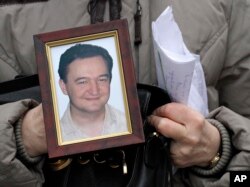Britain will be able to impose sanctions on people who commit gross human rights violations under a so-called "Magnitsky amendment" backed by members of parliament on Tuesday.
The amendment to a new Sanctions and Anti-Money Laundering
Bill going through parliament passed without a vote, because it was backed both by the ruling Conservatives and the main opposition Labor Party.
Lawmakers referred to it during their debate as the Magnitsky amendment, in reference to Sergei Magnitsky, a Russian lawyer who was arrested in 2008 after alleging that Russian officials were involved in large-scale tax fraud. He died in a Moscow prison in 2009 after complaining of mistreatment.
The amendment is not specifically aimed at Russians, but it comes at a time of crisis in relations between Britain and Russia following a nerve agent attack in England on a Russian ex-spy and his daughter, which London blames on Moscow.
Russia has denied any involvement in the attack on Sergei and Yulia Skripal. The standoff has led to tit-for-tat expulsions of diplomats and fiery rhetoric on both sides.
Boris Johnson, Britain's foreign minister, called the passage of the amendment through the House of Commons an "important moment."
"These [provisions] will allow U.K. to act against those responsible for serious offenses worldwide. U.K. stands up for human rights globally," he said on Twitter.
The United States passed a law known as the Magnitsky Act in 2012 under which it has imposed visa bans and asset freezes on Russian officials linked to the lawyer's death.
Prime Minister Theresa May spoke May 14 about bringing forward a Magnitsky Act-style amendment in one of her statements responding to the attack on the Skripals.
Bill Browder, an investment fund manager who employed Magnitsky and has led a campaign to punish Russian officials he blames for the lawyer's death, took to Twitter to thank lawmakers who played a part in the British Magnitsky amendment.
"Thank you for making a UK Magnitsky Act happen," he said.
Russian President Vladimir Putin has dismissed allegations that Magnitsky's death was linked to mistreatment, saying he died of heart failure. A Russian court sentenced Browder in absentia in December to nine years in prison after finding him guilty of deliberate bankruptcy and tax evasion, allegations
Browder denies.












